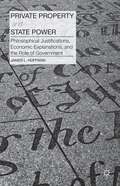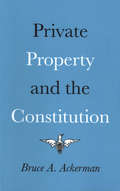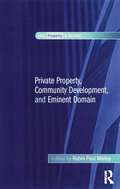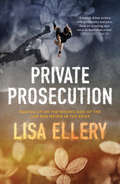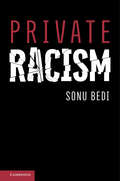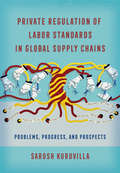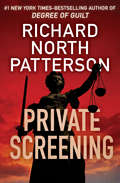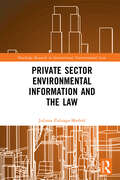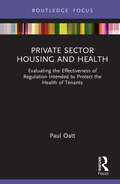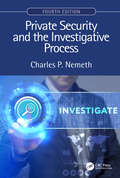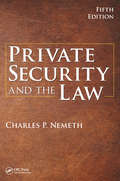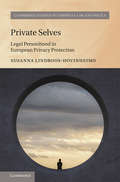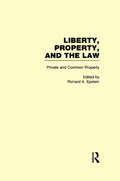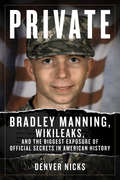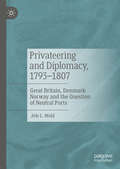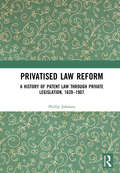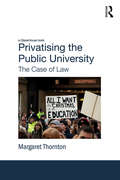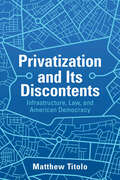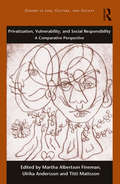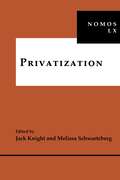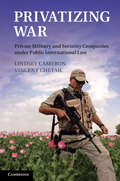- Table View
- List View
Private Property and State Power
by James L. HuffmanThis book details the relationship between private property and government. As private property is important to both individual welfare and the public interest, the book provides an intellectual framework for the analysis and resolution of contemporary property rights disputes.
Private Property and the Constitution
by Bruce AckermanI am deeply indebted to my research assistant, John Borgo, for an ongoing flow of criticism, as well as to my secretary, Diane McDougal, for typing a steady stream of second thoughts. Their work, as well as mine, was supported in part by the Law and Social Science Division of The National Science Foundation. The Foundation,however, should not be held responsible for the views expressed in this essay.I am also very grateful to my many friends at Yale and elsewhere who helped me with this book. But my debts here are so numerous and diverse as to defy a comprehensive and exact accounting.
Private Property and the Endangered Species Act: Saving Habitats, Protecting Homes
by Jason F. Shogren William D. RuckelshausOur whole nation benefits from the preservation of natural habitats and their diversity of animal and plant species—yet small groups of private landowners often bear most of the costs of setting land aside for conservation purposes. This imbalance has generated many conflicts since the passage of the Endangered Species Act in 1973 and remains one of the most controversial issues to be resolved as the ESA makes its way through Congress for reauthorization.
Private Property, Community Development, and Eminent Domain (Law, Property and Society)
by Robin Paul MalloyThe contributors in this volume address the fundamental relationship between the state and its citizens, and among the people themselves. Discussion centers on a recent decision by the United States Supreme Court in the case of Kelo v. City of New London. This case involved the use of eminent domain power to acquire private property for purposes of transferring it by the State to another private party that would make "better" economic use of the land. This type of state action has been identified as an "economic development taking". In the Kelo case, the Court held that the action was legal within provisions of the US Constitution but the opinion was contentious among some of the Justices and has been met with significant negative outcry from the public. The Kelo case and the public debate arising in its aftermath give cause to assess the legal landscape related to the ability of government to fairly balance the tension between private property and the public interest. The tension and the need to successfully strike a balance are not unique to any one country or any one political system. From the United States to the United Kingdom, to the People's Republic of China, property and its legal regulation are of prime importance to matters of economic development and civic institution building. The Kelo decision, therefore, explores a rich set of legal principles with broad applicability.
Private Prosecution
by Lisa ElleryAndrew Deacon is young, fit, and single, a junior prosecutor at the WA DPP with a bright future and a sense of entitlement to match. That future starts to look darker when he spends the night with an attractive stranger, Lily Constantine, and she is found murdered in her apartment the following day. Based on a conversation with Lil, Andrew believes he knows who killed her—a senior criminal law barrister, Sam Godfrey SC, who is also Lil's brother-in-law. Andrew tells the police everything he knows, but his quest to bring Godfrey to justice provokes retaliation and soon Andrew is on the run, with no way forward but to prove Godfrey's guilt. This is a pacy, darkly comic whodunnit with a twist—Andrew knows who did it but the clock is ticking and he has to prove it before he gets himself taken out.
Private Racism
by Sonu BediUsually, when we discuss racial injustice, we discuss racism in our public or political life. This means that we often focus on how the state discriminates on the basis of race in its application and enforcement of laws and policies. This book draws on the synergy of political theory and civil rights law to expand the boundary of racial justice and consider the way in which racial discrimination happens outside the governmental or public sphere. 'Private racism' is about recognizing that racial injustice also occurs in our private lives, including the television and movie industry, cyberspace, our intimate and sexual lives, and the reproductive market. Professor Sonu Bedi argues that private racism is wrong, enlarging the boundary of justice in a way that is also consistent with our Constitution. A more just society is one that seeks to address rather than ignore this less visible form of racism.
Private Regulation of Labor Standards in Global Supply Chains: Problems, Progress, and Prospects
by Sarosh KuruvillaPrivate Regulation of Labor Standards in Global Supply Chains examines the effectiveness of corporate social responsibility on improving labor standards in global supply chains.Sarosh Kuruvilla charts the development and effectiveness of corporate codes of conduct to ameliorate "sweatshop" conditions in global supply chains. This form of private voluntary regulation, spearheaded by Nike and Reebok, became necessary given the inability of third world countries to enforce their own laws and the absence of a global regulatory system for labor standards. Although private regulation programs have been adopted by other companies in many different industries, we know relatively little regarding the effectiveness of these programs because companies don't disclose information about their efforts and outcomes in regulating labor conditions in their supply chains.Private Regulation of Labor Standards in Global Supply Chains presents data from companies, multi-stakeholder institutions, and auditing firms in a comprehensive, investigative dive into the world of private voluntary regulation of labor conditions. The picture he paints is wholistic and raw, but it considers several ways in which this private voluntary system can be improved to improve the lives of workers in global supply chains.
Private Screening: A Novel
by Richard North Patterson&“A crackerjack thriller&” by the #1 New York Times–bestselling author of Silent Witness: A lawyer defending a Vietnam vet is caught in a kidnapper&’s web (Publishers Weekly). All of America is watching when a sniper&’s bullet cuts down presidential hopeful James Kilcannon. As the nation rises up in outrage, one lawyer is bold enough to represent the Vietnam veteran accused of firing the fatal shot. Tony Lord has never shied away from a fight, and he will do whatever it takes to get his client a fair trial. A year later, tragedy strikes Kilcannon&’s rock-star girlfriend, Stacy Tarrant. Her assistant is kidnapped by a masked terrorist known as Phoenix, who threatens to execute him on live television unless he meets Phoenix&’s demands. As Tony helps Stacy through the ordeal, he discovers that Phoenix has connections to the Kilcannon slaying and intends to mount his own televised trial—in which Tony and Stacy are the defendants and Phoenix is the executioner.
Private Screening: A Novel
by Richard North Patterson&“A crackerjack thriller&” by the #1 New York Times–bestselling author of Silent Witness: A lawyer defending a Vietnam vet is caught in a kidnapper&’s web (Publishers Weekly). All of America is watching when a sniper&’s bullet cuts down presidential hopeful James Kilcannon. As the nation rises up in outrage, one lawyer is bold enough to represent the Vietnam veteran accused of firing the fatal shot. Tony Lord has never shied away from a fight, and he will do whatever it takes to get his client a fair trial. A year later, tragedy strikes Kilcannon&’s rock-star girlfriend, Stacy Tarrant. Her assistant is kidnapped by a masked terrorist known as Phoenix, who threatens to execute him on live television unless he meets Phoenix&’s demands. As Tony helps Stacy through the ordeal, he discovers that Phoenix has connections to the Kilcannon slaying and intends to mount his own televised trial—in which Tony and Stacy are the defendants and Phoenix is the executioner.
Private Sector Environmental Information and the Law (Routledge Research in International Environmental Law)
by Juliana Zuluaga MadridCurrent advancements in civil rights and environmental activism emphasize the crucial importance of making environmental information widely available to the public, regardless of whether it is in the hands of the government or of corporations, especially when the information is needed to understand and prevent risks for human health and the environment. In the wake of a resurgence of environmental and civil rights activism, conflicts flare between the right of the people to know and the right of private actors to keep certain information hidden, mostly for commercial reasons. This book offers a detailed comparative analysis of how environmental information is being accessed in different countries and jurisdictions, and how these issues are currently being handled by judges and governments. Focusing on the right of access to environmental information held and produced by private actors and the legal issues that emerge when other values and rights are compromised, this book offers an alternative framework to improve on current legal systems, suggesting a more nuanced and balanced approach that takes both set of interests duly into consideration. Providing an integrated approach to public environmental law and private commercial law, the book integrates the arguments from both sides to establish a common ground, defining shared principles and models that provide a solid basis for a robust new system. Reviewing access to private sector information at a truly international level, this book will be relevant to students, academics and practitioners working in these areas.
Private Sector Housing and Health: Evaluating the Effectiveness of Regulation Intended to Protect the Health of Tenants (Routledge Focus on Environmental Health)
by Paul OattThis book is an evaluation of the effectiveness of housing enforcement and tenant protection in England’s private rented sector using policy analysis to evaluate regulatory provisions and local authority guidance to identify the advantages and limitations of existing policies. From the environmental health practitioner perspective, the targeted health problem is occupiers privately renting from negligent or criminal landlords who are subsequently exposed to hazardous conditions arising from disrepair.Paul Oatt’s analysis looks at the powers local authorities have to address retaliatory eviction when enforcing against housing disrepair and digs deeper into their duties to prevent homelessness and powers to protect tenants from illegal eviction. He then explores the potential for tenants to take private action against landlords over failures to address disrepair, before finally discussing proposals put forward by the government to abolish retaliatory evictions and improve security of tenure with changes to contractual arrangements between landlords and tenants, based on successive stakeholder consultations. The policy analysis looks at these aspects to define the overall effectiveness of housing strategies and their implementation, examining causality, plausibility and intervention logic as well as the unintended effects on the population. Equitability is examined to see where policy effects create inequalities as well as the costs, feasibility and acceptability of policies from landlords' and tenants’ perspectives. The book will be of relevance to professionals interested in housing and health, as well as students at universities that teach courses in environmental health, public health, and housing studies.
Private Security and the Investigative Process, Fourth Edition
by Charles P. NemethPrivate Security and the Investigative Process, Fourth Edition is fully updated and continues to provide complete coverage of the investigative process for private investigations by both individuals and in corporate security environments. This edition covers emerging technology, revised legal and practical considerations for conducting interviews, and new information on case evaluation. Written by a recognized expert in security, criminal justice, ethics, and the law—with over three decades of experience—the updated edition of this popular text covers concepts and techniques that can be applied to a variety of investigations including fraud, insurance, private, and criminal. It details the collection and preservation of evidence, the handling of witnesses, surveillance techniques, background investigations, and report writing. The book reflects best practices and includes tips for ensuring accurate and reliable private sector security investigations. This new edition includes: A new section on career opportunities in paths in the investigative field A rundown of the leading security Industry associations and professional standards being published Added discussion of observational interviews include current protocols analyzing data Details of the current legal implications for security surveillance and practices Advances in technology to thwart crime and fraud in retail and other business settings An entirely new section on e-records from criminal and civil judgments Authoritative, yet accessible, this book is one of the only textbooks dedicated to the subject. It also serves as an important reference for private investigators and security professionals. Complete with numerous forms, checklists, and web exercises, it provides the tools and understanding required to conduct investigations that are professional, ethical, and effective.
Private Security and the Law (5th Edition)
by Charles P. Nemeth<p>Private Security and the Law, Fifth Edition, is a singular resource that provides the most comprehensive analysis of practices in the security industry with respect to law, regulation, licensure, and constitutional questions of case and statutory authority. <p>The book begins with a historical background of the security industry, laws and regulations that walks step-by-step through the analysis of the development of case law over the years as it applies to situations commonly faced by security practitioners. It describes the legal requirements faced by security firms and emphasizes the liability problems common to security operations, including negligence and tortious liability, civil actions frequently litigated, and strategies to avoid legal actions that affect business efficiency. <p>In addition, chapters examine the constitutional and due-process dimensions of private security both domestically and internationally, including recent cases and trends that are likely to intensify in the future. Updated coverage new to this edition includes developments in statutory authority, changes to state and federal processes of oversight and licensure, and special analysis of public-private cooperative relationships in law enforcement.</p>
Private Selves: Legal Personhood in European Privacy Protection (Cambridge Studies in European Law and Policy)
by Susanna Lindroos-HovinheimoData protection has become such an important area for law – and for society at large – that it is important to understand exactly what we are doing when we regulate privacy and personal data. This study analyses European privacy rights focusing especially on the GDPR, and asks what kind of legal personhood is presupposed in privacy regulation today. Looking at the law from a deconstructive angle, the philosophical foundations of this highly topical field of law are uncovered. By analysing key legal cases in detail, this study shows in a comprehensive manner that personhood is constructed in individualised ways. With its clear focus on issues relating to European Union law and how its future development will impact wider issues of privacy, data protection, and individual rights, the book will be of interest to those trying to understand current trends in EU law.
Private Wrongs
by Arthur RipsteinTort law recognizes the many ways one person wrongs another. Arthur Ripstein brings coherence to torts' diversity in a philosophically grounded, analytically powerful theory. He shows that all torts violate the basic moral idea that each person is in charge of his or her own person and property, and never in charge of another's person or property.
Private and Common Property: Liberty, Property, and the Law
by Richard A. EpsteinFirst published in 2000. Routledge is an imprint of Taylor and Francis, an informa company.
Private: Bradley Manning, WikiLeaks, and the Biggest Exposure of Official Secrets in American History
by Denver NicksBradley Manning perpetrated the biggest breach of military security in American history. This intelligence analyst leaked an astounding amount of classified information to WikiLeaks: classified combat videos and hundreds of thousands of documents from the wars in Afghanistan and Iraq and from embassies around the globe. Almost all of WikiLeaks's headline-making releases of information have come from one source only: Bradley Manning. The leaks affected governments the world over--the Arab uprisings were spurred, in part, by Manning's revelations. They propelled WikiLeaks to a level of international prominence it never had before. The world would never be the same. Bradley Manning's story is one of global significance, and yet he remains an enigma. Now, for the first time, the full truth will be told about a man who, at the age of only twenty-two, changed the world. Nicks's book paints a nuanced portrait of a man haunted by demons and driven by hope, impulsive and cocky yet idealistic enough to follow his conscience. Relying on numerous conversations with those who know Manning best, Nicks gives the full story of a bright, gay kid from middle America who signs on to serve his country and finds himself serving a cause he finds far more sinister, and why he betrayed his oath and fellow troops--and his own future--in order to fulfill what he saw as a higher purpose. Denver Nicks has written for The Daily Beast, The Nation, AlterNet, and other publications. He lives in New York City.
Privateering and Diplomacy, 1793–1807: Great Britain, Denmark-Norway and the Question of Neutral Ports
by Atle L. WoldThis book addresses the British-Danish diplomatic debate on privateering and neutral ports in the period 1793-1807, when Denmark-Norway remained neutral in the war between Britain and France. The British government protested against the use French privateers made of Norwegian ports as bases for their attacks on the British Baltic Sea and Archangel Trades, but the Danish government insisted on keeping the ports open. This led to a running dispute on the relative rights and duties of belligerents and neutrals, but also on violations of the tentative agreement that the two governments reached in 1793. The three main chapters in the book address the principled debate on privateering and neutral ports; the central role played in the debate by the British diplomatic and consular representatives in Denmark-Norway; and privateering in practice. The final two chapters look at the impact of the Dutch change of sides in the war in 1795, and the development from the official closure of the Norwegian ports to privateers in 1799 until Denmark-Norway’s entry into the war on the side of France in 1807.
Privates Baurecht praxisnah: Basiswissen mit Fallbeispielen
by Cornelius Pfisterer Axel Wirth Barbara SchellenbergAlle am Bau Beteiligten müssen mit dem Baurecht vertraut sein, um bei der Durchführung von Bauvorhaben die baurechtlichen Zusammenhänge zu erkennen und bei auftretenden rechtlichen Problemen die richtigen Lösungsschritte daraus abzuleiten. Dieses Fachbuch vermittelt anschaulich die Grundzüge des Privaten Baurechts mit dem Fokus auf Problemstellungen, die bei der Durchführung von Bauvorhaben auftreten. Zahlreiche Fallbeispiele mit Lösungen, die auf realer Rechtsprechung basieren, runden das Werk ab: Ein Einstieg in das Private Baurecht und ein unverzichtbares Nachschlagewerk für alle, die am Bau tätig sind.
Privatised Law Reform: A History Of Patent Law Through Private Legislation, 1620-1907
by Phillip JohnsonIn the history of British patent law, the role of Parliament is often side-lined. This is largely due to the raft of failed or timid attempts at patent law reform. Yet there was another way of seeking change. By the end of the nineteenth century, private legislation had become a mechanism or testing ground for more general law reforms. The evolution of the law had essentially been privatised and was handled in the committee rooms in Westminster. This is known in relation to many great industrial movements such as the creating of railways, canals and roads, or political movements such as the powers and duties of local authorities, but it has thus far been largely ignored in the development of patent law. This book addresses this shortfall and examines how private legislation played an important role in the birth of modern patent law.
Privatising the Public University: The Case Of Law
by Margaret ThorntonFirst Published in 2011. Routledge is an imprint of Taylor & Francis, an informa company.
Privatization and Its Discontents: Infrastructure, Law, and American Democracy
by Matthew TitoloIn Privatization and Its Discontents, Matthew Titolo situates the contemporary debate over infrastructure in the long history of public–private governance in the United States. Titolo begins with Adam Smith's arguments about public works and explores debates over internal improvements in the early republic, moving to the twentieth-century regulatory state and public-interest liberalism that created vast infrastructure programs. While Americans have always agreed that creation and oversight of 'infrastructure' is a proper public function, Titolo demonstrates that public–private governance has been a highly contested practice throughout American history. Public goods are typically provided with both government and private actors involved, resulting in an ideological battle over the proper scope of the government sphere and its relationship to private interests. The course of that debate reveals that 'public' and 'private' have no inherent or natural content. These concepts are instead necessarily political and must be set through socially negotiated compromise.
Privatization, Vulnerability, and Social Responsibility: A Comparative Perspective (Gender in Law, Culture, and Society)
by Martha Albertson Fineman Ulrika Andersson Titti MattssonTaking a cross-cultural perspective, this book explores how privatization and globalization impact contemporary feminist and social justice approaches to public responsibility. Feminist legal theorists have long problematized divisions between the private and the political, an issue with growing importance in a time when the welfare state is under threat in many parts of the world and private markets and corporations transcend national boundaries. <p><P> Because vulnerability analysis emphasizes our interdependency within social institutions and the need for public responsibility for our shared vulnerability, it can highlight how neoliberal policies commodify human necessities, channeling unprofitable social relationships, such as caretaking, away from public responsibility and into the individual private family. This book uses comparative analyses to examine how these dynamics manifest across different legal cultures. By highlighting similarities and differences in legal responses to vulnerability, this book provides important insights and arguments against the privatization of social need and for a more responsive state.
Privatization: NOMOS LX (NOMOS - American Society for Political and Legal Philosophy #29)
by Melissa SchwartzbergA distinguished group of scholars explore the moral values and political consequences of privatization The 21st century has seen a proliferation of privatization across industries in the United States, from security and the military to public transportation and infrastructure. In shifting control from the state to private actors, do we weaken or strengthen structures of governance? Do state-owned enterprises promise to be more equal and fair than their privately-owned rivals? What role can accountability measures play in mediating the effects of privatization; and what role does coercion play in the state governance and control? In this latest installment from the NOMOS series, an interdisciplinary group of distinguished scholars in political science, law, and philosophy examine the moral and political consequences of transferring state-provided or state-owned goods and services to the private sector. The essays consider how we should evaluate the decision to privatize, both with respect to the quality of outcomes that might be produced, and in terms of the effects of privatization on the core values underlying democratic decision-making. Privatization also affects the structure of governance in a variety of important ways, and these essays evaluate the consequences of privatization on the state. Privatization sheds new light on these highly salient questions of contemporary political life and institutional design.
Privatizing War
by Lindsey Cameron Vincent ChetailA growing number of states use private military and security companies (PMSCs) for a variety of tasks, which were traditionally fulfilled by soldiers. This book provides a comprehensive analysis of the law that applies to PMSCs active in situations of armed conflict, focusing on international humanitarian law. It examines the limits in international law on how states may use private actors, taking the debate beyond the question of whether PMSCs are mercenaries. The authors delve into issues such as how PMSCs are bound by humanitarian law, whether their staff are civilians or combatants, and how the use of force in self-defence relates to direct participation in hostilities, a key issue for an industry that operates by exploiting the right to use force in self-defence. Throughout, the authors identify how existing legal obligations, including under state and individual criminal responsibility should play a role in the regulation of the industry.
